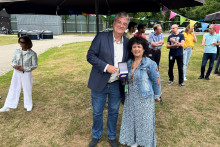The legal support, according to Brack, fits perfectly in the UT's Route 14 policy. He thinks the UT will gain the label of a society and technology university. `An organization like Kennispark fits seamlessly in this picture. In order to start a company, you need more than just technological knowledge.'
According to Brack, a starting entrepreneur must do four things. `He needs to explore the market, further develop the product, attract financiers for the starting period, and he needs legal support system.' The latter is mostly about coaching says Brack. `We don't want to make them into hothouse plants,' he laughs. `The young entrepreneurs must be able to withstand a collision. We don't want to let them grow up too sheltered. The things that matter are aspects like support, oracle, conversation partner or steering. We won't do work like setting-up contracts, making statutes or drafting last wills. No, we only give legal advice. You can look at us as a sort of legal general practitioner.' According to the professor there is a need for this service. `Mostly because starters don't have the money to hire a lawyer or because the threshold of going to a notary or lawyer's office is financially too high.' Another reason is that legal knowledge of the new facility is specialized in technological products. `We can specifically think of solutions with the entrepreneur.'
Brack says the legal support is a sort of knowledge valorization. `It's part of the mission of the UT: making work from knowledge. The in house expertise we have at the UT is used to help starters on their way. We do that for UT employees, students or PhD-students. But the exact audience is not fixed to the letter. When is someone a starter? It differs from company to company. And why don't we do this for the whole of Twente? That's what can be called knowledge valorization!' With a phone call or e-mail - which can be found on the website - starting entrepreneurs can access the available legal knowledge network. Ultimately, the legal counter seeks to yield more businesses. `We need more successful businesses where multiple people work and this will bring in more employment opportunities. That is the social side of knowledge valorization. On the other side, there is self-interest: in the surrounding area of the UT more companies will be founded which are interesting for internship or research positions.'
Hans Prins, who has worked as a consultant in the field of patent law at Arnold + Siedsma, will succeed Arnold Louët Feisser. Both will speak at the symposium that will start today at 3 pm at the Drienerburght hotel.







